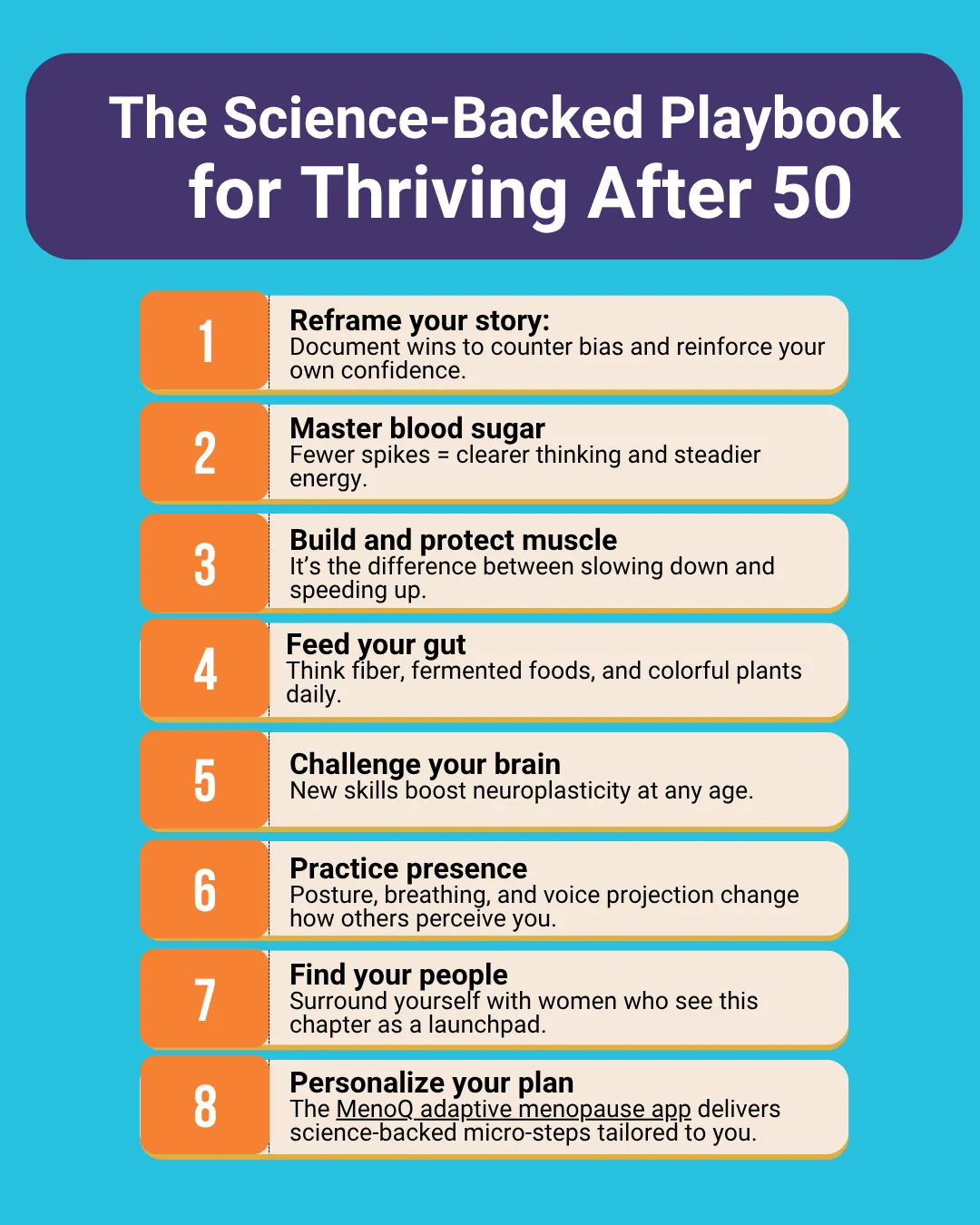
The Science of Being Underestimated: Why Women Over 50 Are Just Hitting Their Peak
The Science of Being Underestimated: Why Women Over 50 Are Just Hitting Their Peak
A few years back, I decided to run a tiny experiment, one of those “let’s just see” ideas you try over a cup of coffee.
I had two versions of the exact same YouTube video. Same script. Same science. Same insights.
One was my face and voice.
The other was a man’s face and voice.
Can you guess what happened?
The man’s version took off like wildfire. Mine… not so much. And yes, his version even picked up fewer negative comments.
Coincidence? Please.
This wasn’t just about a video. It was a perfect snapshot of how women, especially over 50, are still treated in society, even in the very topics we know inside out. In this case? Menopause. My research specialty. My literal field.

Why This Isn’t Just in My Head
If you’ve ever felt like your expertise was ignored, doubted, or “politely” dismissed, it’s not because you imagined it. The numbers make it painfully clear:
Women over 50 are 48% less likely to be hired than men the same age.
By 60, we’re 80% more likely to face workplace bias than male peers.
In Hollywood, only 5% of female characters are over 60 while men that age dominate more than half of those roles.
These aren’t just workplace stats. This is cultural wiring. When society sees fewer older women leading on-screen, it seeps into boardrooms, labs, and every kind of leadership role.
The Hidden Science of Bias
Here’s the sneaky part. Bias doesn’t just shape how others see us, it starts to shape how we see ourselves.
Psychologists call this stereotype threat. When you’re aware of a stereotype about your group, it can subtly affect your performance and confidence. Think of it as background noise in your brain saying, “You’re not as sharp as you used to be,” even when the science says otherwise.
Menopause: The Plot Twist Society Didn’t See Coming
Menopause symptoms around age 50, hot flashes, brain fog, fatigue, are real. But they’ve been wildly misrepresented.
Here’s what’s really happening, in plain English:
Estrogen and progesterone decline, which affects neurotransmitters like serotonin and dopamine (your mood and motivation messengers).
Your thermostat control center in the hypothalamus becomes more sensitive, triggering hot flashes.
Sleep disruptions mess with cortisol (your stress hormone) and insulin (your blood sugar regulator), making energy dips and brain fog more likely.
Sounds grim? Not really. Because here’s the part no one tells you: while some brain functions shift, others actually improve.
Your Brain’s Secret Midlife Upgrade
Let’s talk cognitive reserve.
This is your brain’s backup power supply, the ability to find new neural pathways when old ones slow down. By midlife, especially if you’ve kept learning and challenging yourself, your cognitive reserve is rich.
And while processing speed may dip a little, other areas like semantic memory (your deep library of facts, context, and insights) and pattern recognition are sharper than ever. This is why you can cut through complex situations faster than you could at 30, your brain has more cross-references to pull from.
Your Body at 50+ Is a High-Performance Machine (With the Right Fuel)
We’ve been taught that midlife metabolism is doomed, but that’s only true if you keep using the same “fuel plan” you had in your 20s. The hormonal shifts of menopause change how your body uses energy, stores fat, and builds muscle, but with the right adjustments, you can feel better than you did a decade ago.
Here’s what the research says works:
Protein is non-negotiable: Aim for about 30g per meal to maintain muscle and stabilize blood sugar.
Muscle is your metabolism’s best friend: Two or three short strength sessions a week can increase energy and confidence.
Gut health equals brain health: Your microbiome talks directly to your brain through the vagus nerve. Feeding it fiber and fermented foods boosts mood and focus.
Why Society Downplays This Power
Let’s be blunt. Confident, energetic women over 50 disrupt the narrative. We don’t “fade into the background.” We start businesses, run teams, travel, and speak our minds. We’ve stopped playing small.
And for systems used to women shrinking with age, that’s… inconvenient.

The Science-Backed Playbook for Thriving After 50
Want the condensed version of what works? Here’s the midlife power formula I’ve seen transform women’s lives, rooted in both research and real-world results:
Reframe your story: Document wins to counter bias and reinforce your own confidence.
Master blood sugar: Fewer spikes = clearer thinking and steadier energy.
Build and protect muscle: It’s the difference between slowing down and speeding up.
Feed your gut: Think fiber, fermented foods, and colorful plants daily.
Challenge your brain: New skills boost neuroplasticity at any age.
Practice presence: Posture, breathing, and voice projection change how others perceive you.
Find your people: Surround yourself with women who see this chapter as a launchpad.
Personalize your plan: Generic advice won’t cut it. The MenoQ adaptive menopause app delivers science-backed micro-steps tailored to your exact needs in under three minutes a day.
The Bottom Line
If you take nothing else from this, take this: you are not past your prime, you are in it. Your brain is smarter. Your body can be stronger. Your voice is more valuable than ever.
The only real question is whether you’ll let old narratives keep you quiet, or you’ll step into the room and own it.
And if you want science-backed tools, tips, and strategies delivered to your inbox three to four times a week, join my free newsletter.
